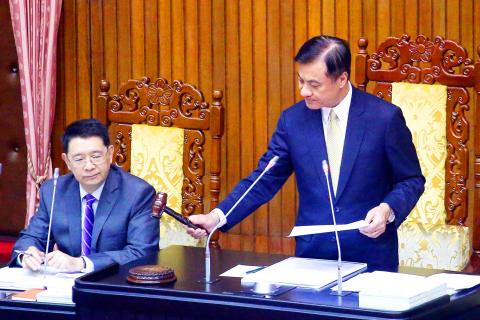Taiwanese who commit aggravated fraud overseas are now to be subject to punishment in Taiwan after the Legislative Yuan passed an amendment to the Criminal Code yesterday.
The amendment to Article 5 of the Criminal Code added “aggravated fraud” to the list of offenses committed “outside the territories of the Republic of China” to which the Criminal Code will apply, making it easier to prosecute suspects in Taiwan.
The revision is to take effect when it is promulgated by the president, a formality that usually takes about two weeks.

Photo: CNA
Under existing law, aggravated fraud is not among the offenses listed under Article 5, making it nearly impossible for authorities to prosecute alleged fraudsters after they return to Taiwan.
In some cases, offenses committed overseas, but not listed in Article 5, may still be covered by the Criminal Code, but only if they are punishable by at least three years in jail.
As people guilty of fraud in Taiwan face jail sentences of between one and seven years and fines of up to NT$1 million (US$31,378), many cases do not meet the three-year threshold.
These legal loopholes have often forced prosecutors to drop cases against citizens suspected of committing fraud overseas.
Chinese Nationalist Party (KMT) Legislator Hsu Shu-hua (許淑華), who proposed the amendment, said a spate of recent cross-border telecom fraud cases involving Taiwanese called attention to the nation’s lenient treatment of its citizens committing fraud overseas and the possibility that it encouraged more criminal activity.
These cross-border fraud cases have tarnished the image of Taiwan’s judicial system and given the impression that “Taiwan is unwilling to harshly crack down on fraud and condones the perpetrators’ actions,” or that “Taiwan is a haven for fraudsters,” she said.
Hsu supported Taiwan’s judicial authorities having jurisdiction over Taiwanese who commit fraud overseas, which she said would live up to the expectations of the public and improve the image of the nation’s judiciary.
Dozens of Taiwanese have been arrested in countries such as Kenya, Malaysia and Indonesia over the past year for suspected involvement in fraud rings that were scamming people in China.
China then pushed, successfully in most cases, to have Taiwanese sent to China for prosecution rather than to Taiwan, arguing that it had jurisdiction over the cases because the victims were in China and Taiwan would not punish the suspects.

Intelligence agents have recorded 510,000 instances of “controversial information” being spread online by the Chinese Communist Party (CCP) so far this year, the National Security Bureau (NSB) said in a report yesterday, as it warned of artificial intelligence (AI) being employed to generate destabilizing misinformation. The bureau submitted a written report to the Legislative Yuan in preparation for National Security Bureau Director-General Tsai Ming-yen’s (蔡明彥) appearance before the Foreign Affairs and National Defense Committee today. The CCP has been using cognitive warfare to divide Taiwanese society by commenting on controversial issues such as Taiwan Semiconductor Manufacturing Co’s (TSMC, 台積電) investments in the

INVESTIGATION: The case is the latest instance of a DPP figure being implicated in an espionage network accused of allegedly leaking information to Chinese intelligence Democratic Progressive Party (DPP) member Ho Jen-chieh (何仁傑) was detained and held incommunicado yesterday on suspicion of spying for China during his tenure as assistant to then-minister of foreign affairs Joseph Wu (吳釗燮). The Taipei District Prosecutors’ Office said Ho was implicated during its investigation into alleged spying activities by former Presidential Office consultant Wu Shang-yu (吳尚雨). Prosecutors said there is reason to believe Ho breached the National Security Act (國家安全法) by leaking classified Ministry of Foreign Affairs information to Chinese intelligence. Following interrogation, prosecutors petitioned the Taipei District Court to detain Ho, citing concerns over potential collusion or tampering of evidence. The

‘COMPREHENSIVE PLAN’: Lin Chia-lung said that the government was ready to talk about a variety of issues, including investment in and purchases from the US The National Stabilization Fund (NSF) yesterday announced that it would step in to staunch stock market losses for the ninth time in the nation’s history. An NSF board meeting, originally scheduled for Monday next week, was moved to yesterday after stocks plummeted in the wake of US President Donald Trump’s announcement of 32 percent tariffs on Taiwan on Wednesday last week. Board members voted to support the stock market with the NT$500 billion (US$15.15 billion) fund, with injections of funds to begin as soon as today. The NSF in 2000 injected NT$120 billion to stabilize stocks, the most ever. The lowest amount it

NEGOTIATIONS: Taiwan has good relations with Washington and the outlook for the negotiations looks promising, Minister of Economic Affairs J.W. Kuo said Taiwan’s GDP growth this year is expected to decrease by 0.43 to 1.61 percentage points due to the effects of US tariffs, National Development Council (NDC) Minister Paul Liu (劉鏡清) said at a meeting of the legislature’s Economics Committee in Taipei yesterday, citing a preliminary estimate by a private research institution. Taiwan’s economy would be significantly affected by the 32 percent “reciprocal” tariffs slapped by the US, which took effect yesterday, Liu said, adding that GDP growth could fall below 3 percent and potentially even dip below 2 percent to 1.53 percent this year. The council has commissioned another institution